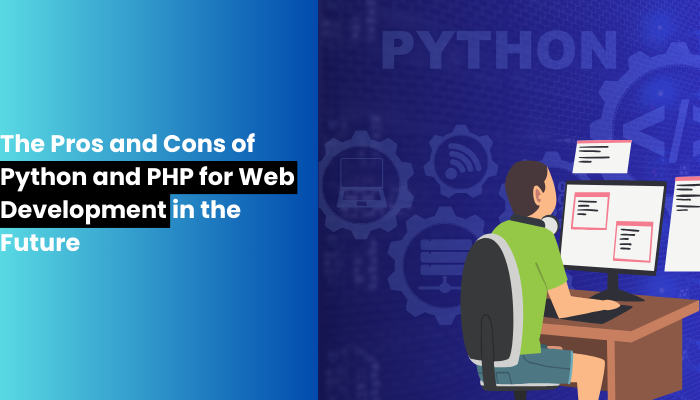The Pros and Cons of Python and PHP for Web Development in the Future
 Leo Johnson
Leo Johnson
In the rapidly evolving landscape of web development, choosing the right programming language is crucial. Python and PHP are two popular choices for web development, each with its own set of advantages and disadvantages. Let's delve into the pros and cons of Python and PHP to help you make an informed decision for the future of web development.
Python for Web Development
Pros
Versatility: Python is renowned for its versatility and can be used for a wide range of web development tasks, including backend development, data analysis, artificial intelligence, and more.
Readability: Python's clean and readable syntax makes it an ideal choice for developers, leading to faster development and easier maintenance.
Large Community and Ecosystem: Python boasts a large and active community, along with a rich ecosystem of libraries and frameworks such as Django, Flask, and Pyramid, which can expedite development processes.
Scalability: Python's scalability makes it suitable for handling large and complex web applications, ensuring that it can grow alongside your business needs.
Cons
Performance: Python is not as fast as some other programming languages, which can be a concern for high-traffic websites or applications that require intense computational processing.
Asynchronous Programming: While Python has made strides in asynchronous programming with libraries like asyncio, it still lags behind some other languages in this aspect.
Hosting Costs: Python web applications can sometimes be more expensive to host compared to PHP due to the additional resources they require.
PHP for Web Development
Pros
Popularity and Support: PHP powers a significant portion of the web, making it a well-established language with extensive community support and a myriad of resources.
Speed: PHP is known for its speed and efficiency, making it an excellent choice for developing dynamic web applications and websites.
Integration: PHP seamlessly integrates with various databases, such as MySQL, making it an optimal choice for database-driven web applications.
Cost-Effective Hosting: Hosting PHP applications is often more cost-effective, as PHP is supported by a wide range of hosting providers.
Cons
Syntax: PHP's syntax has been a subject of debate, with some developers finding it less elegant and more error-prone compared to other languages.
Security: PHP has had its share of security issues in the past, and while significant improvements have been made, it still requires careful attention to avoid vulnerabilities.
Fragmented Ecosystem: PHP's ecosystem comprises a multitude of frameworks and libraries, which can sometimes lead to fragmentation and make it challenging to choose the right tools for a project.
The Future of Web Development
As we look to the future of web development, both Python and PHP are likely to maintain their relevance, each with its own strengths and weaknesses.
Python's Future
Python's prominence in fields such as data science, machine learning, and artificial intelligence positions it as a compelling choice for web development in the future. The continued growth of its ecosystem and the community's dedication to enhancing its performance are indicative of a promising future for Python in web development.
PHP's Future
While PHP has faced criticism in the past, it continues to evolve with improved performance, security enhancements, and modernized features. The release of PHP 8 has brought significant improvements, and its widespread adoption ensures that PHP will remain a key player in web development in the foreseeable future.
Conclusion
In conclusion, both Python and PHP offer distinct advantages and drawbacks for web development. When considering the future of web development, it is important to evaluate the specific requirements of your project and the strengths of each language. Python's versatility and scalability make it an attractive choice for complex web applications, while PHP's speed, integration capabilities, and cost-effectiveness make it well-suited for a wide range of web development projects. Ultimately, the choice between Python and PHP should be guided by the unique needs and long-term goals of your web development endeavors.
Subscribe to my newsletter
Read articles from Leo Johnson directly inside your inbox. Subscribe to the newsletter, and don't miss out.
Written by

Leo Johnson
Leo Johnson
I'm Leo Johnson, a passionate frontend developer based in the Usa. With a deep love for all things web, I strive to create captivating digital experiences that leave a lasting impression.